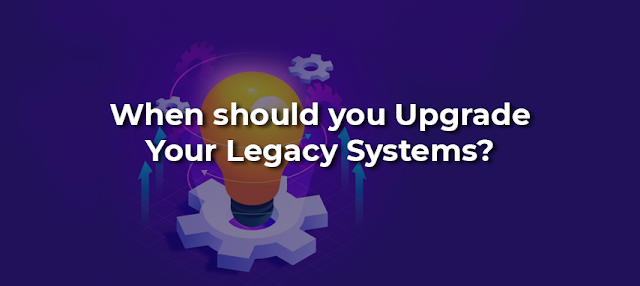Reasons Why Your Legacy System May Require an Upgrade
Do you have a pair of carpet slippers that you feel very comfortable
in? The chances are good that you wear them as you lounge in your living room,
catching your favorite TV show or browsing social media using Spectrum
internet. But no matter how much you love those slippers, and how comfortable they
are, there will come a time when they become worn and threadbare. In other
words, they will become obsolete, and you will have to let go of your comfort
and buy a new pair. The same principle applies to a business with outdated
legacy systems. After a certain point, it will be holding you back instead of
supporting your growth. Read on to find out more.
Reasons to
Upgrade Your Legacy Systems
Modern consumers have very high expectations not just from products,
but from the customer experience that brands offer. Regardless of what the size
or nature of your business is, offering a seamless customer experience at every
step of the funnel is essential to acquire more customers. However, modern
technology changes faster than we can keep up with it. A legacy system that
supports your business operations today may become obsolete by the end of next
year.
Legacy systems are essentially information systems that are based on
older technology but are still critical to a business’s modern-day functioning.
While they may get the job done right now, there is no guarantee that it will
in the future. Since expansion and growth are core business objectives, it is
more than likely that a legacy system will become obsolete after a certain
period of time. But there are also several other reasons that prompt businesses
to upgrade from legacy systems to more modern information infrastructures,
which can include the following:
1.
Saving
Money on Systems Maintenance and Support
2.
Deliver
An Experience Appropriate To Customer Expectations
3.
Improved
Performance and Fewer Bottlenecks
4.
Integration
With Other Business Systems
Let’s examine these in more detail below.
Saving
Money on Systems Maintenance and Support
Since it is the infrastructure to share and access business
information, legacy information systems require extensive maintenance as well
as technical support. This ensures smoother functioning of the system, which
improves workflows and productivity. However, after some time, it starts to
become increasingly expensive to continue to spend on maintenance and support
for legacy systems. The opportunity cost is obvious. You will end up spending
valuable resources on simply maintaining a system when you could be directing
the same resources to generate more revenue.
By comparison, newer information systems require much less
maintenance. They are more sophisticated, but also better designed, with fewer
bugs and a greater focus on usability and user experience. That means you will
be spending much less on maintenance and technical support.
Deliver an
Experience Appropriate to Customer Expectations
It is very unlikely that you are the only player in your industry or
niche. You likely have a number of competitors, many of whom offer identical
products or services. In this context, what will motivate a consumer to choose
your business over other similar ones? The answer lies in offering a better
customer experience than the competition. However, a legacy system can place
significant technological constraints on the experience a brand can offer to
its customers. By comparison, modern cloud-based or similar information systems
improve value delivery by speeding up business processes. They also improve the
reliability and consistency of the results, which means a uniform standard for
all consumers.
Improved
Performance and Fewer Bottlenecks
Employee performance is a priority of every business manager and
leader. The productivity levels of your workforce have a direct impact on the
revenues and profits your business generates. Better productivity equals more
work accomplished and more revenue generated. Conversely, poor productivity
could mean a drop in revenues because less work gets done. Among the many
factors that impact employee productivity, the state of your information
systems is a crucial area. Legacy systems tend to be slower, clunkier, and more
awkward than their newer counterparts. Even if your productivity levels are
satisfactory, upgrading to a new system will improve them further. Because
newer business systems are faster, they can help boost productivity, and reduce
the usual bottlenecks in most processes.
Integration
With Other Business Systems
Very few legacy systems are designed with integration in mind. At the
time, there was more focus on building a standalone, monolithic solution
customized for use by specific businesses. This means your legacy system likely
cannot communicate with any newer business software that you might be using.
This leads to massive inefficiency, with workflows often being duplicated and
redundant. Modern business systems are designed to integrate with a number of
widely used applications and platforms. Working together, they can help boost
team and departmental collaboration as well as productivity.
Conclusion
There’s
no simple way to determine if your business requires a massive overhaul of its
legacy information systems. It is not as easy as carrying out an internet speed test. You will have to assess various aspects,
including the costs of implementing a new system, usability testing, migration,
and even employee resistance to change. The success of your new system will
depend heavily on how you tackle these factors. But one thing is for sure, a
business that wants to scale up and grow can’t do so with business systems that
are outdated. An infrastructural overhaul may be expensive, but it can be the
best option for meeting your long-term business goals.







